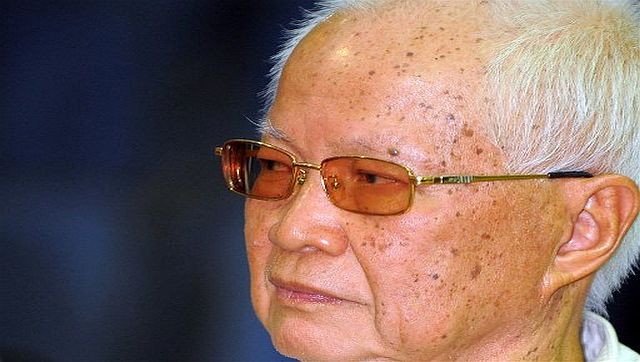Phnom Penh: Cambodia’s United Nations-backed war crimes tribunal will hand down its final verdict on Thursday, a judgment in the appeal of the last surviving senior Khmer Rouge leader Khieu Samphan. The 91-year-old who served as the Communist regime’s head of state was sentenced in 2018 by an UN-backed court to life in prison for crimes against humanity and genocide. Here’s what we know about the Khmer Rouge: Who were they? The ultra-Maoist Khmer Rouge ruled Cambodia from 1975 to 1979 under the leadership of “Brother Number One” Pol Pot — a charismatic intellectual who studied in France. The movement started in the northeastern jungles of the kingdom, where Pol Pot recruited supporters and waged guerrilla warfare against the repressive governments of Cambodia of the time. On 17 April, 1975, Khmer Rouge troops marched into Phnom Penh, toppling the US-backed dictatorship of General Lon Nol — who had staged a coup against then-Prince Norodom Sihanouk. Declaring it “Year Zero”, Pol Pot aimed to reset — or “cleanse” — Cambodian culture in order to build an agrarian utopia. Millions of Phnom Penh residents were ordered to leave their homes and trek to the countryside, forced to work in labour camps. During its almost four-year grip on the country, more than two million Cambodians — nearly a quarter of the kingdom’s population — died from mass executions, starvation and overwork. What did they do? The Khmer Rouge demanded unquestioning loyalty to “Angkar” — which translates to “the organisation” in Khmer — and ties to anyone deemed “impure” was dangerous. Intellectuals, former civil servants and members of the police and armed forces often fell into the “impure” category, while ethnic minorities — including Vietnamese and Cham Muslims — were also systematically targeted. Strong familial bonds were also considered a betrayal to “Angkar”, and relatives were encouraged to report on each other. Tens of thousands of men and women were also forced to marry and consummate the unions — under threat of death if refused — in order to boost the population. Towards the end of the regime, the Khmer Rouge devoured its own ranks with repeated purges, driven by paranoia from the leadership that the revolution’s enemies were hidden within. Who supported them? The regime’s biggest backer was China, which pledged a billion dollars in aid to Pol Pot, Sebastian Strangio, the author of “In the Dragon’s Shadow” and “Hun Sen’s Cambodia”, had told AFP. The US also indirectly helped to bolster the ranks of the Khmer Rouge, as carpet-bombings in Vietnam, Cambodia and Laos bred resentment among locals against the Western superpower. After the Khmer Rouge was ousted by Vietnamese-backed troops in 1979 it received some backing from the United States, which saw it as a check on communist Hanoi. Western support also ensured the Khmer Rouge continued to hold on to Cambodia’s seat at the UN until 1993. What was the role of PM Hun Sen? Asia’s longest-serving leader Hun Sen rose through the ranks of the Khmer Rouge to become battalion commander before fleeing the country for Vietnam in 1977 to escape one of the many internal purges. Local history books play down the role he played during the Khmer Rouge’s rule, but credit him with leading Vietnamese troops into the country to oust Pol Pot from power on 7 January, 1979. Attempts to investigate the role of other individuals has been restricted by the current government, which contains several former Khmer Rouge members. Hun Sen has said he wanted an UN-backed tribunal to only investigate the regime’s top echelon, warning that opening further cases would plunge the country into instability. What justice has there been? Launched in 2006, the tribunal — which cost more than $330 million — has so far convicted just three people. The regime’s chief interrogator Kaing Guek Eav, better known as Duch, was the first to face judgment and his testimony revealed aspects of the secretive regime that were not previously known to the public. He was sentenced to life imprisonment in 2012. The other two convicted were Nuon Chea, “Brother Number Two” and chief ideologue of the regime, and Khieu Samphan, the former head of state who served as the Khmer Rouge’s public face to the world. Critics have castigated interference by the government and the pace of proceedings. “The court has proven far from perfect — with overt and covert political interference by the Cambodian government resulting, for instance, in some highly controversial rulings by the tribunal’s Cambodian judges,” said Robert Carmichael, author of “When Clouds Fell From the Sky”, chronicling Duch’s trial. But that there was a tribunal at all remains “a victory of sorts”, he told AFP. “A judicial process, then, while far from perfect is better than nothing.” Read all the Latest News , Trending News , Cricket News , Bollywood News , India News and Entertainment News here. Follow us on Facebook, Twitter and Instagram.
The Khmer Rouge leader Khieu Samphan, who served as the Communist regime’s head of state, was sentenced in 2018 by an UN-backed court to life in prison for crimes against humanity and genocide
Advertisement
End of Article


)

)
)
)
)
)
)
)
)



